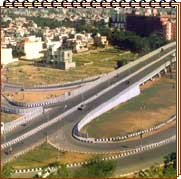|
 India is the seventh largest and second most populous country in the world. A new spirit of economic freedom is now stirring in the country, bringing sweeping changes in its wake. A series of ambitious economic reforms aimed at deregulating the country and stimulating foreign investment has moved India firmly into the front ranks of the rapidly growing Asia Pacific region and unleashed the latent strengths of a complex and rapidly changing nation. India's process of economic reform is firmly rooted in a political consensus that spans her diverse political parties. India's democracy is a known and stable factor, which has taken deep roots over nearly half a century. Importantly, India has no fundamental conflict between its political and economic systems. Its political institutions have fostered an open society with strong collective and individual rights and an environment supportive of free economic enterprise.
India is the seventh largest and second most populous country in the world. A new spirit of economic freedom is now stirring in the country, bringing sweeping changes in its wake. A series of ambitious economic reforms aimed at deregulating the country and stimulating foreign investment has moved India firmly into the front ranks of the rapidly growing Asia Pacific region and unleashed the latent strengths of a complex and rapidly changing nation. India's process of economic reform is firmly rooted in a political consensus that spans her diverse political parties. India's democracy is a known and stable factor, which has taken deep roots over nearly half a century. Importantly, India has no fundamental conflict between its political and economic systems. Its political institutions have fostered an open society with strong collective and individual rights and an environment supportive of free economic enterprise.
India's time tested institutions offer foreign investors a transparent environment that guarantees the security of their long-term investments. These include a free and vibrant press, a judiciary that can and does overrule the government, a sophisticated legal and accounting system and a user-friendly intellectual infrastructure. India's dynamic and highly competitive private sector has long been the backbone of its economic activity. It accounts for over 75% of its Gross Domestic Product and offers considerable scope for joint ventures and collaborations.
Today, India is one of the most exciting emerging markets in the world. Skilled managerial and technical manpower that match the best available in the world and a middle class whose size exceeds the population of the USA or the European Union, provide India with a distinct cutting edge in global competition.
The road transport sector has been declared a priority and will have access to loans at favorable conditions. The Monopoly and Restrictive Trade Practices Act (MRTP Act) was passed in order to encourage large industry to enter the road sector.
The National Highways Act has been modified to help the reduction of tolls on national motorways, bridges and tunnels. Calcutta's Howrah Bridge is the world's busiest with a daily flow of 57,000 vehicles and innumerable pedestrians. Private participation in the energy sector has been encouraged with the reduction of import duties, a five-year tax exemption for new energy projects and a 16% return on equity.
The government is also following a new telecommunications policy that aims for the improvement of quality to a worldwide standard and, as a result, India could emerge as a major producer and exporter of telecommunication systems. Advantageous policies in this sector are encouraging private and foreign participation. Given below is a profile of the present Indian Union Infrastructure:
Click on the following links to know more about INDIA.
India Facts and Figures |
hotels in kerala India |
Geography of India |
hotels in mumbai India |
Economy and Infrastructure of India |
Future of India |
Map of India
| Recommended Tours |
Best of India Tour
Days : 08 Days / 07 Nights
Destinations : Delhi- Agra- Fatehpur Sikri- Jaipur- Udaipur
|
|
 |
|
|
 |
Splendid Rajasthan Tour
Days : 10 Days / 09 Nights
Destinations : Delhi-Udaipur-Narlai-Rohet-Jodhpur-Jaipur-Fatehpur Sikri-Agra
|
|
 |
Kerala Holidays Tour
Days : 13 Days / 12 Nights
Destinations : Cochin- Alleppey- Munnar- Periyar- Cardamom House- Madurai-Chennai
|
|
|
 |
| 
